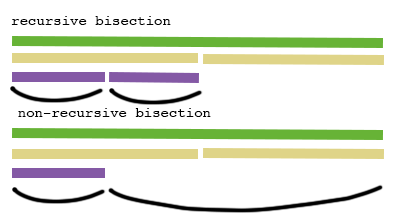5.7 KiB
ADR 046: Lite Client Implementation
Changelog
- 13-02-2020: Initial draft
- 26-02-2020: Cross-checking the first header
- 28-02-2020: Bisection algorithm details
Context
A Client struct represents a light client, connected to a single blockchain.
As soon as it's started (via Start), it tries to update to the latest header
(using bisection algorithm by default).
Cleaning routine is also started to remove headers outside of trusting period.
NOTE: since it's periodic, we still need to check header is not expired in
TrustedHeader, TrustedValidatorSet methods (and others which are using the
latest trusted header).
The user has an option to manually verify headers using VerifyHeader and
VerifyHeaderAtHeight methods. To avoid races, UpdatePeriod(0) needs to be
passed when initializing the light client (it turns off the auto update).
type Client interface {
// start and stop updating & cleaning goroutines
Start() error
Stop()
Cleanup() error
// get trusted headers & validators
TrustedHeader(height int64) (*types.SignedHeader, error)
TrustedValidatorSet(height int64) (valSet *types.ValidatorSet, heightUsed int64, err error)
LastTrustedHeight() (int64, error)
FirstTrustedHeight() (int64, error)
// query configuration options
ChainID() string
Primary() provider.Provider
Witnesses() []provider.Provider
// verify new headers
VerifyHeaderAtHeight(height int64, now time.Time) (*types.SignedHeader, error)
VerifyHeader(newHeader *types.SignedHeader, newVals *types.ValidatorSet, now time.Time) error
}
A new light client can either be created from scratch (via NewClient) or
using the trusted store (via NewClientFromTrustedStore). When there's some
data in the trusted store and NewClient is called, the light client will a)
check if stored header is more recent b) optionally ask the user whenever it
should rollback (no confirmation required by default).
func NewClient(
chainID string,
trustOptions TrustOptions,
primary provider.Provider,
witnesses []provider.Provider,
trustedStore store.Store,
options ...Option) (*Client, error) {
witnesses as argument (as opposite to Option) is an intentional choice,
made to increase security by default. At least one witness is required,
although, right now, the light client does not check that primary != witness.
When cross-checking a new header with witnesses, minimum number of witnesses
required to respond: 1. Note the very first header (TrustOptions.Hash) is
also cross-checked with witnesses for additional security.
Due to bisection algorithm nature, some headers might be skipped. If the light
client does not have a header for height X and VerifyHeaderAtHeight(X) or
VerifyHeader(H#X) methods are called, it will perform a backwards
verification from the latest header back to the header at height X.
TrustedHeader, TrustedValidatorSet only communicate with the trusted store.
If some header is not there, an error will be returned indicating that
verification is required.
type Provider interface {
ChainID() string
SignedHeader(height int64) (*types.SignedHeader, error)
ValidatorSet(height int64) (*types.ValidatorSet, error)
}
Provider is a full node usually, but can be another light client. The above interface is thin and can accommodate many implementations.
If provider (primary or witness) becomes unavailable for a prolonged period of time, it will be removed to ensure smooth operation.
Both Client and providers expose chain ID to track if there are on the same
chain. Note, when chain upgrades or intentionally forks, chain ID changes.
The light client stores headers & validators in the trusted store:
type Store interface {
SaveSignedHeaderAndValidatorSet(sh *types.SignedHeader, valSet *types.ValidatorSet) error
DeleteSignedHeaderAndValidatorSet(height int64) error
SignedHeader(height int64) (*types.SignedHeader, error)
ValidatorSet(height int64) (*types.ValidatorSet, error)
LastSignedHeaderHeight() (int64, error)
FirstSignedHeaderHeight() (int64, error)
SignedHeaderAfter(height int64) (*types.SignedHeader, error)
}
At the moment, the only implementation is the db store (wrapper around the KV
database, used in Tendermint). In the future, remote adapters are possible
(e.g. Postgresql).
func Verify(
chainID string,
h1 *types.SignedHeader,
h1NextVals *types.ValidatorSet,
h2 *types.SignedHeader,
h2Vals *types.ValidatorSet,
trustingPeriod time.Duration,
now time.Time,
trustLevel tmmath.Fraction) error {
Verify pure function is exposed for a header verification. It handles both
cases of adjacent and non-adjacent headers. In the former case, it compares the
hashes directly (2/3+ signed transition). Otherwise, it verifies 1/3+
(trustLevel) of trusted validators are still present in new validators.
Bisection algorithm details
Non-recursive bisection algorithm was implemented despite the spec containing the recursive version. There are two major reasons:
- Constant memory consumption => no risk of getting OOM (Out-Of-Memory) exceptions;
- Faster finality (see Fig. 1).
Fig. 1: Differences between recursive and non-recursive bisections
Specification of the non-recursive bisection can be found here.
Status
Accepted.
Consequences
Positive
- single
Clientstruct, which is easy to use - flexible interfaces for header providers and trusted storage
Negative
Verifyneeds to be aligned with the current spec
Neutral
Verifyfunction might be misused (called with non-adjacent headers in incorrectly implemented sequential verification)

